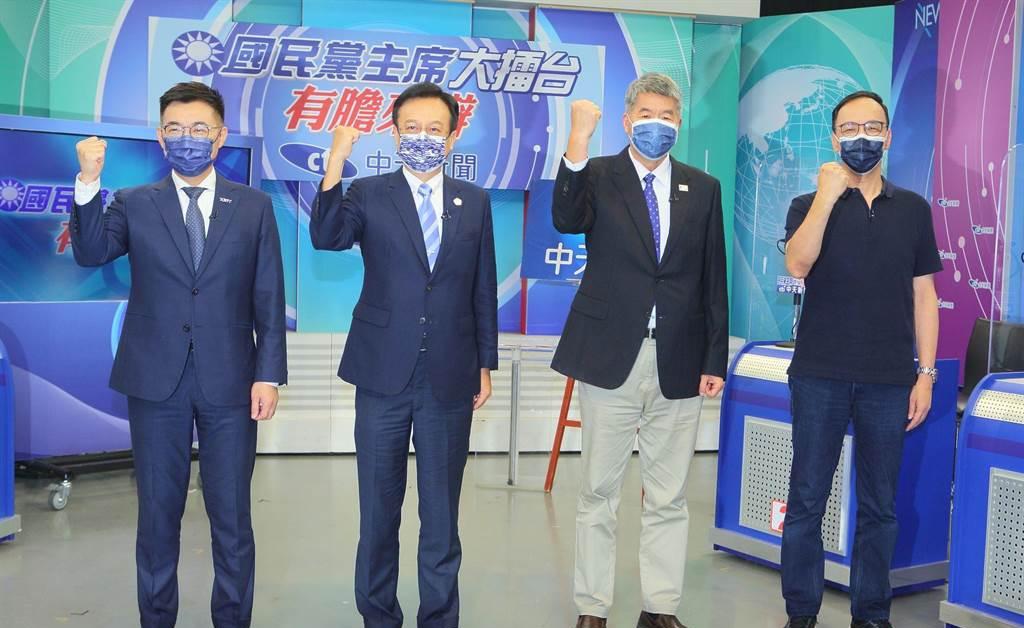Taiwan's Zhongtian News held a "Kuomintang Chairman's Big Stage" yesterday (18), and all four candidates came together to devote themselves to the road of party chairman in the "Golden Week Before the Election." The two-hour confrontation is dizzying. According to Taiwan media data, the total number of online people in the entire debate exceeded 50,000, and the performance of the four candidates was also widely discussed.

Lu Xiaowei, former head of the Kuomintang Youth League, said that the most eye-catching aspect of this debate was that Zhu Lilun and Zhang Yazhong caught each other in attack and defense, Jiang Qichen showed his own political achievements, and Zhuo Boyuan emphasized the full-time party chairman. Unfortunately, although the four people have their own characteristics, but the performance is not ideal, as a young man in the blue camp, I hope that the four people can not only talk about ideas and political views, but also grasp the last week to explain more clearly how to implement.
Lü Xiaowei believes that since it is an intra-party election, the position of the four people will inevitably be carried out simultaneously towards "deep blue". For example, those who originally questioned the "1992 Consensus" have now emphasized its importance; those who were originally open to changing the party's name must now defend the "golden signboard." Among them, Jiang Qichen has the advantage of being incumbent, and when debating, he puts forward specific and operational arguments for youth participation in politics and party affairs reform, and at the same time shows 17 months of political achievements, but he is also the most read by the four people. At the time of Zhu Zhang's entanglement, Jiang inevitably had a crisis of being marginalized.
Lü Xiaowei said that Zhu Lilun's candidacy is the leader, but the debate performance is like a laggard, and he constantly questions Zhang Yazhong's "urgent reunification" stance, and obviously wants to turn the "Zhujiang dispute" into a "Zhujiang dispute" and create a renunciation of insurance. However, Zhu did not clearly answer his own position and opponent's questions, but instead focused on accusing Zhang Yazhong, which was a major shortcoming. Zhang Yazhong seems to be affected by the poll rumors, locking the attack on Zhu Lilun, and the two buckled their hats to each other, and even some emotion. The whole debate was completely focused on cross-strait policy, and how to reconcile within the party. How can youth participation be promoted? How to reform party organizations and so on, almost all of them have no ink, which is a pity. In addition, political parties must first adopt "political power" in order to implement their own policies, and Zhang should explain the operational aspects of party reform and how to make the discourse supported by the majority of voters.
As for Zhuo Boyuan, Lü Xiaowei believes that he is the most moderate, not only is he not angry, but he can also answer questions with ease, emphasizing political views such as full-time party chairman, but he is also the lowest sense of existence among the four.
Su Huanzhi, the governor of Nan County, was interviewed after watching the entire debate, and constantly laughed, saying that Zhu Lilun was very dangerous and not so stable, and Zhang Yazhong was not without opportunities because the packaging of the discourse was very "fresh"; as for Jiang Qichen and Zhuo Boyuan, they were marginalized.
Su Huanzhi pointed out that Jiang Qichen and Zhu Lilun's cross-strait exposition is a relatively traditional KMT exposition, but this bottleneck lies in the fact that it does not exceed Ma Ying-jeou's category, so the old tune is repeated, and everyone will not feel that there will be a breakthrough in future cross-strait relations. Relatively speaking, Zhang Yazhong is a more successful packaging strategy, which will have a fresh feeling for the traditional "deep blue" group, and may also attract some "middle blue".
Referring to Jiang Qichen, Su Huanzhi said that Jiang was not originally a person with strong combat effectiveness, and this is where the "deep blue" ethnic group is very depressed, "If he is very strong, no one can take the position of party chairman today." Originally, the situation was very unfavorable to Jiang Qichen, but now Zhang Yazhong is rising up, which is even more unfavorable to Jiang. Zhu and Zhang are fighting each other, and such a debate format has also clearly marginalized the Jiang and Zhuo groups. (Lin Jingxian/Editor)